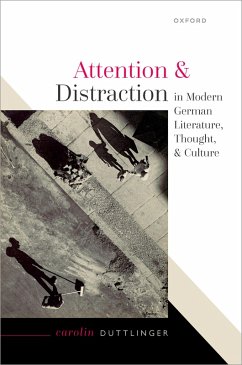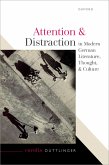Attention is fundamental to how we experience reality, and yet this notion has been understood and practised in very different ways across history. This interdisciplinary study explores the dynamic relationship between attention and its supposed opposite, distraction, as it unfolds from the eighteenth century to the present day. Its primary focus is on twentieth-century Germany and Austria, where matters of (in)attention gained a unique urgency during a period of social change and political crisis. Building on Enlightenment practices of self-observation, nineteenth-century Germany was the birthplace of experimental psychology, a discipline which sought to measure and potentially enhance human attention. This approach was also adopted outside the psychological laboratory--for instance in the First World War, when psychological testing was used to select soldiers for particular strategic positions. After the war these techniques filtered through into everyday life. Weimar Germany was unique in the western world in rolling out the methods of 'psychotechnics' across civilian society--in fields such as work and education, advertising and mass entertainment. This state-sponsored programme aimed to reshape people's minds and behaviour in order to build a more efficient, streamlined society. But as this study shows, this initiative also had profound repercussions in the fields of thought, literature, and culture. New readings of leading writers and intellectuals of the period--Kafka, Musil, Kracauer, Benjamin, and Adorno--are interspersed with broader cultural-historical chapters dedicated to the history of psychology and psychiatry, to Weimar self-help literature, portrait photography, and musical culture.
Dieser Download kann aus rechtlichen Gründen nur mit Rechnungsadresse in A, B, BG, CY, CZ, D, DK, EW, E, FIN, F, GR, HR, H, IRL, I, LT, L, LR, M, NL, PL, P, R, S, SLO, SK ausgeliefert werden.









